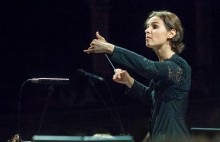Classical and modern, academic and folk art – every genre was presented at two grand concerts of the Velvet Season Festival – “Berehynia. The Revival of the Soul” and “At the Turn of the Century.”
The former of the concerts is an author’s project by Oksana Lyniv. A conductor of Lviv school, she currently represents Bavarian State Opera, but keeps her connection with Ukraine and Odesa (where she worked from 2008 to 2013). Lyniv’s conducting style can be defined as “pedantic expression” or “expressive pedantry”: an almost ballet posture, an almost “graphical” plasticity, in general – a style characteristic of Lviv and yet entirely European.
The project’s concept was to have classical texts written by males (Taras Shevchenko and Pavlo Tychyna) and contemporary Ukrainian music voiced by women’s voices and illustrated by women’s paintings (by artist Ola Rondiak from the US). The vocal and instrumental music works are the chamber symphony and chamber cantata by Oleh Kiva, “Five wedding songs from Pokuttia” by Oleksandr Kozarenko, and Yevhen Stankovych’s theme from the film Outcast; these works were contrasted by purely instrumental ones by Mykola Kolessa and Oleksandr Kozarenko. Moreover, the latter also performed as a soloist in his own emotional and yet powerful Concerto Rutheno for piano and orchestra. The vocal “quartet” of the concert was comprised of soloists of Odesa Opera Anastasia Holub and Kateryna Tsymbaliuk, as well as guest stars Mariana Sadovska and Nina Matviienko.
The contemporary Ukrainian academic music is rather difficult to understand and requires a considerable effort from the listener – even from an experienced one such as an Odesaite. But the latter audience has been finally conquered and subdued, when the singers, accompanied by the orchestra, performed “A Duckling Swims on the Tysyna River” at the end of the concert, out of the program. This version (female voices singing in a combination of academic and folk style) became what the song originally was – women weeping over a fallen son; Ukraine, which is very different and has many voices, weeping over its dead children. Volodymyr Vynnychenko once said that “Ukrainian history should be read with bromine.” And such history becomes reflected in music...
In turn, ballet performance “At the Turn of the Century” amused the audience with favorite bits of popular repertoire (excerpts from the ballets by Aram Khachaturian, Ferdinand Herold, Fikret Amirov, and others), as well as presented two premieres of young choreographers. Yanina Kyseliova introduced a scene ballet in several acts Between the Lines, which, as it seemed, failed to produce the complete harmonious composition in terms of the proportion between classical and modern dance, the melodramatic story based on love triangle, and the grand-scale music by Abel Korzeniowski, Thomas Bergersen, and Michael Laurence Nyman. On the other hand, the “plotless” miniature Images and Ideas, which presented the choreography of Ihor Sarazhynsky to the music of Zoe Keating, has achieved the precise combination of classic and contemporary, in the subjective author’s opinion; the overall imagery has brought about many feelings and associations.
The Velvet Season Festival demonstrated a modern, European musical theater – the field which is not rigid and conservative, but one open to many brands and many formats. Thus, Odesa Opera is on the right track.







